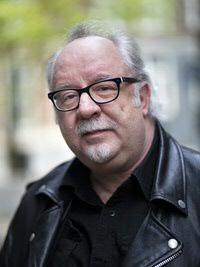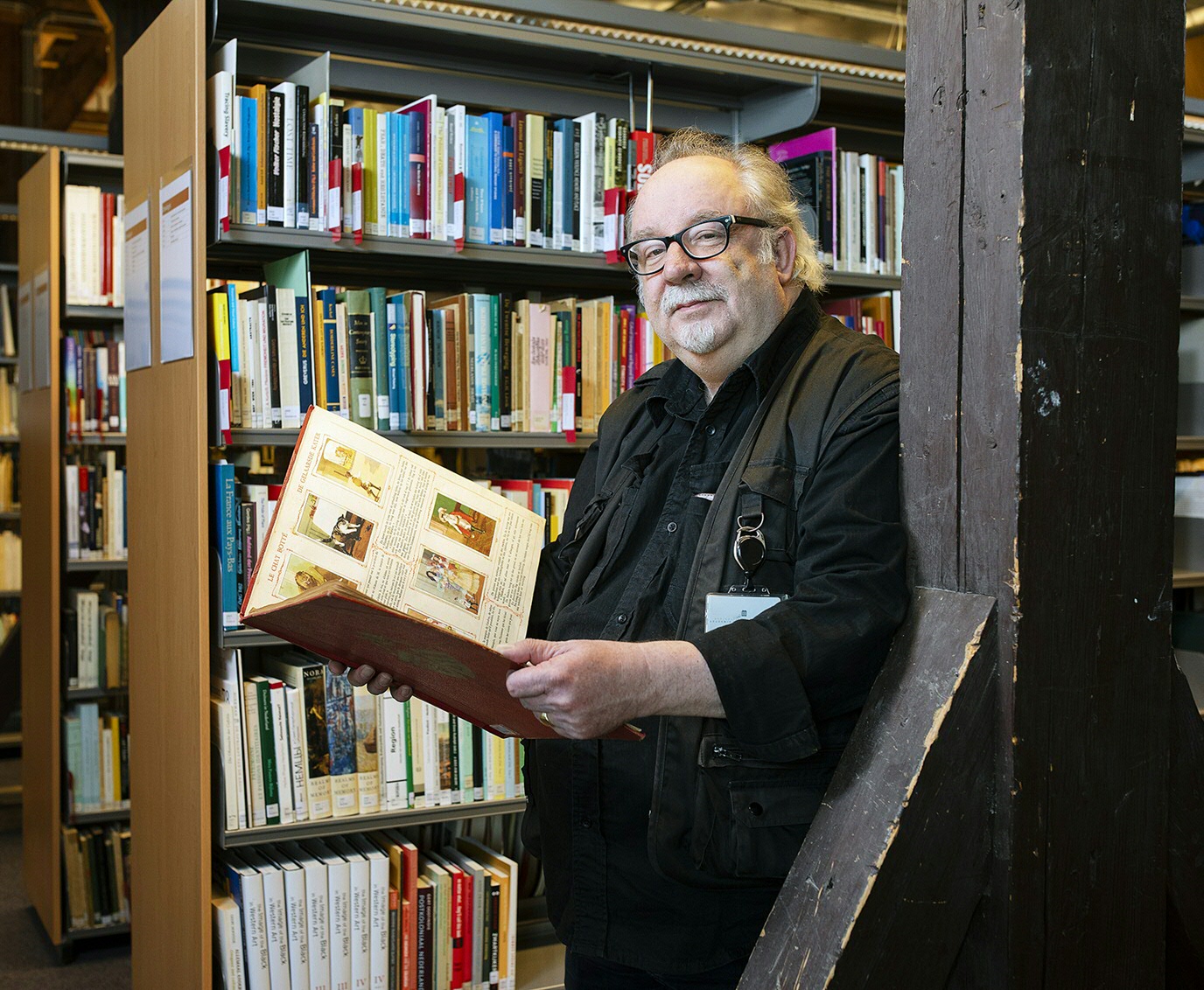Folktales, the barometers of society

Urban legends, legends, fairy tales and jokes: Professor of Folktales and Narrative Culture Theo Meder knows all about them. But next to studying old folktales, he is also look ing for new histories.
Text: Bineke Bansema / Photos: Jeroen van Kooten
Theo Meder remains seated behind his desk when he receives his visitors, because there is not enough space to welcome them otherwise. His office has to be one of the smallest ones in the Harmonie building. This is not entirely surprising, as he is only in Groningen for one day each week. He spends the rest of his week working at the Meertens Institute in Amsterdam, which gained fame in the 1990s through J.J. Voskuil’s epic saga Het Bureau. Meder cannot say that he has worked together with Voskuil, but he still enjoys the company of many of Voskuil’s colleagues. ‘I can recognize all of them in his books’, he says, smiling. ‘Some were proud that they became a character in a novel, even if they were not always portrayed in a flattering light.’
Trijntje Soldaats
Anyone who takes a look at Meder’s own website can spend hours on it without realizing. You can find links to the Nederlandse Volksverhalenbank (Dutch Folktales Database), which is maintained by the Meertens Institute and contains over 46,000 folktales. You can also learn what exactly was going on with the famous Dutchman Hans Brinker, who is mostly famous among Americans. If you are on the road, the collection of walking and bicycling routes inspired by folktales and intended for tourists could be of interest, on www.sagenjager.nl. Anyone who wants to get to know the stories of the Northern Netherlands can go on a bicycle tour all the way around the Groningen Hogeland area – or follow in the footsteps of Trijntje Soldaats, who told fairy tales to her young fellow villager Gerrit between 1800 and 1804, on a walking tour near Ezinge. Gerrit recorded Trijntje’s stories in a notebook, which was later published as Het boek van Trijntje Soldaats (‘The book of Trijntje Soldaats’). It is one of the oldest collections of orally transmitted fairy tales and came into being before the Grimm brothers recorded their own.
- Meder's own website: www.theomeder.nl
Studying Dutch
Meder, who is from Vlaardingen, followed his degree programme in Leiden. ‘Like many of my fellow students, I wanted to study Dutch because I wanted to write a novel. This has not happened yet. Perhaps I’ll do it when I retire, although I am also drawn to the idea of writing a handbook on folktales because this still does not exist in the Netherlands. Or I could follow a story-telling course, to bring what I have studied for years into practice.’ During his degree programme, Meder was fascinated by Dutch literature in the Middle Ages, also called ‘Middle Dutch Literature’. When it appeared as if he would be without work after finishing his three-year position as a postdoc following his graduation, his family advised him to apply to the Meertens Institute, where a position had opened up that they were looking to fill with an anthropologist. He was taken on as a researcher of folktales.

Barometers
Meder became a professor in Groningen in 2015. For one day per week he does research, supervises PhD students and the Master’s thesis students, attends meetings and gives lectures. International students of the Dutch Studies programme follow his Dutch Folktales course unit, in which they learn everything about folktales. ‘Old stories that have mostly been transmitted orally and that tell much about the life, fears and dreams, faith and mentality of a people – throughout history, folktales have been the barometers of the sentiments in society’, says Meder. He interviewed residents with various backgrounds in the Lombok district in the city of Utrecht, wrote a book on the crop circle hype in the twentieth century and mingled in New Age circles. Nowadays, you can find modern variants of narrative culture on the internet, on Twitter or in your own email inbox. For example, in scam emails that are supposedly from Nigeria, fraudsters tell tales that are too good to be true in order to swindle the reader out of their money.
Wilhelmus – the Dutch national anthem
Meder enjoys teaching, and especially on modern developments – for example, in the course unit on e-Humanities in Dutch Language and Culture. In this course unit, students learn to use tools that allow them to look into the old files of, for example, the KB National Library of the Netherlands. They also learn to work with Stylo, a software package that can be used to study texts stylistically. Meder enthusiastically explains: ‘Thanks to stylometric tools, colleague researchers have recently identified the most likely author of the Wilhelmus (the Dutch national anthem): clergyman Datheen, who is also the author of rhymed versions of the psalms. By loading texts written by eligible authors into the program, together with the text of the Wilhelmus, and comparing, for example, how often and in which way articles and prepositions were used, you can identify the author.’ Future students will be able to further develop the field using these modern tools.
| Last modified: | 21 September 2021 12.57 p.m. |
More news
-
29 April 2024
Tactile sensors
Every two weeks, UG Makers puts the spotlight on a researcher who has created something tangible, ranging from homemade measuring equipment for academic research to small or larger products that can change our daily lives. That is how UG...
-
16 April 2024
UG signs Barcelona Declaration on Open Research Information
In a significant stride toward advancing responsible research assessment and open science, the University of Groningen has officially signed the Barcelona Declaration on Open Research Information.
-
02 April 2024
Flying on wood dust
Every two weeks, UG Makers puts the spotlight on a researcher who has created something tangible, ranging from homemade measuring equipment for academic research to small or larger products that can change our daily lives. That is how UG...
